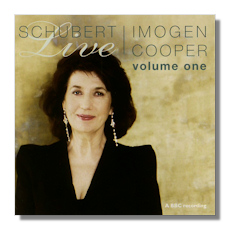
The Internet's Premier Classical Music Source
Related Links
- Schubert Reviews
- Latest Reviews
- More Reviews
-
By Composer
-
Collections
DVD & Blu-ray
Books
Concert Reviews
Articles/Interviews
Software
Audio
Search Amazon
Recommended Links
Site News
 CD Review
CD Review
Franz Schubert

Imogen Cooper, Volume 1
- Piano Sonata in A Major, D. 959
- Eleven Ecossaises, D. 781
- 3 Klavierstücke, D. 946
- Piano Sonata in A minor, D. 845
- Piano Sonata in D Major, D. 850
Imogen Cooper, piano
Avie AV2157 2CDs
This is the first in a series of three (so far) two-CD sets of live recitals given in 2008 by Imogen Cooper at London's Southbank Centre in association with the now ailing BBC Radio 3, their once great music and arts radio station. It's marketed by the British-based Avie label; here the first volume is considered. Avie AV2157 the second.
It must be said at the outset that Cooper's playing is of the very highest quality. These recordings would grace anyone's Schubert shelves as first choices. Hers are interpretations of great sensitivity combined with deep insight. Although it's relatively easy to overplay the early Romantic glow which Schubert infused his late sonatas in particular with more marked rubato, lingering, languorous phrasing and generally slower, more deliberate tempi, it's not so easy to convey the composer's pathos, regret and melancholy (not to mention moments of joy and elation) with playing that's also appropriately precise and full of informed rigor. But listen to the way Cooper negotiates the turns and bends of the fourth movement of D959 [CD.1 tr.4], for example. Her approach has the directness and transparency of Richter playing Schumann and the limpid gentleness of Brendel playing Beethoven.
Cooper believes that the single defining quality even of Schubert's instrumental works was his love for the voice. From it emanates the poetic. From the poetic emerges the lyrical… in piano writing. It's natural, then, that superfluous variations in dynamic and histrionic phrasing have no place. Listen to the way that all the emotion of the first movement of D946 [CD.1 tr.6] is present, pressing and properly situated without any "effects". Feeling generates itself specifically from the music. Her handling of the affective is one of Cooper's strengths.
Another is her technical brilliance. Though it never intrudes. It's always in the service of Schubert's musical intentions. This means that Cooper's phrasing, sense of the music's architecture, variations in tempi and the ways in which harmonies speak to one another in the interests of lyricism across movements, whole works even, must all be perfectly effected and should allow the listener to muse, reflect or even speculate. They do. Sadness and regret have to be contained and reflected, not raw. And not alluded to in the way in which one might approach Chopin, for example, for his sparks and splinters.
The gentleness and directness could so easily result in an insipid style where a lesser pianist fears commitment. Not so with Cooper. Maybe because her extreme familiarity over a lifetime of work with Schubert has allowed her an extremely finely-tuned sense of where the music allows interpretative "give" (some of the trills, the modal passages in the Ecossaises, D781 [CD.1 tr.5], for instance) and where it insists. Instructively, Cooper generally treats the famed endings of these late sonatas as the latter. Impact would have been lost if she hadn't respected the works as straddling the pinnacle between the Classical and Romantic.
Her tempi are nevertheless slow and airy enough for the nuances and import of each work to breath and uncurl; but naturally enough for us to see into their essences and carry them with us long after her last note has died away. If her lyrical style were histrionic, we'd carry the exaggeration with us. It works both ways: the end of D946 [CD.1 tr.8], for instance, is punchier yet full of feeling. So as Cooper has it, we carry away the music.
The production by Avie is to their usually high standard. The booklet with the CDs is clean and functional with background essays on the works by Misha Donat. A typically trenchant paragraph by Cooper herself which lacks all hint self-promotion; and there are detailed track listings. The acoustic is less resonant than one might expect from the size of the Queen Elizabeth Hall in London; so the recording engineers have done an excellent job of capturing the immediacy of the piano. Yet there is applause: it's a public occasion. And obviously one which the public there enjoyed. A special recital of what for many lovers of the piano repertoire is itself special played by a dedicated pianist, and one of the most perceptive playing at the moment. Warmly recommended.
Copyright © 2010 by Mark Sealey.





















